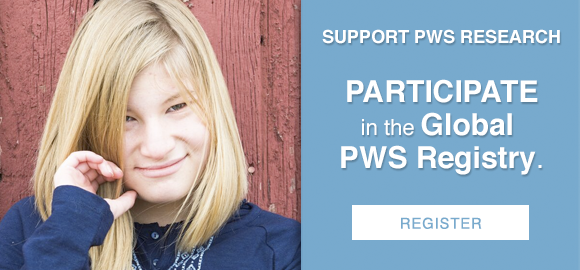FPWR is pleased to announce the launch of an exciting new research study: the PWS Genome Project.
This study will provide new insight into how variations across the entire genome influence the range and severity of symptoms in people with Prader-Willi syndrome. The goals of this Prader-Willi syndrome research study are to identify genetic variants that influence the risk and severity of symptoms, and in the long term, understand how DNA variants impact response to different treatments for PWS.
The PWS Genome Project is a natural progression of the Global PWS Registry study. Since 2015, caregivers in the PWS community have provided valuable insights into the natural history of PWS by completing surveys that cover the many areas impacted by PWS, such as sleep, orthopedics, GI, mental health, the effectiveness of prescription medication, and much, much, more. Now, we hope to make connections between an individual’s genome and the symptoms they experience.
The information gained from this study may be helpful for PWS families, clinicians, and the scientific community to better understand the individual risk for PWS symptoms, as well as response to treatments. “We’re excited to take the first steps towards harnessing the knowledge of the genome to better understand and optimize individual outcomes for those with PWS,” said Theresa Strong, Director of Research Programs.
Analysis of the DNA sequences will be performed at the University of Alabama at Birmingham (UAB). Liz Worthey, who leads the Center for Computational Genomics and Data Science at the UAB School of Medicine stated, “PWS patients are burdened with a highly complex array of symptoms. By using both whole genome sequencing and RNAseq, we’ll be working to discover and understand the molecular mechanisms that underlie those symptoms, and potentially lead to new therapies. Aiding patient cohorts and individual patients with rare, undiagnosed, or misdiagnosed disease is the primary focus of our expert team. We’re honored that FPWR chose our team for this study.”
As part of the initiative, FPWR has partnered with My Gene Counsel, a digital health company that provides innovative genetic counseling solutions, to support the responsible return of select genetic test results to research participants with PWS who undergo whole genome sequencing. FPWR will return pathogenic variants in genes on the American College of Medical Genetics and Genomics Secondary Findings list (ACMG SF v3.0) to participants and has enlisted My Gene Counsel to help return these results in a safe and responsible way.
Would you like to participate in the PWS Genome Project?
Interested participants need to:
- Have a genetically confirmed diagnosis of PWS
- Be between 10-65 years old
- Reside in the United States, and
- Either be enrolled in or be willing to enroll in the Global PWS Registry.
The initial pilot study will enroll approximately 50 participants with the hopes of expanding enrollment in the future.
We would like to thank our generous supporters; it would not be possible without your support. FPWR is quite excited for this study to begin!
For more information, download the PWS Genome Project Infosheet.








